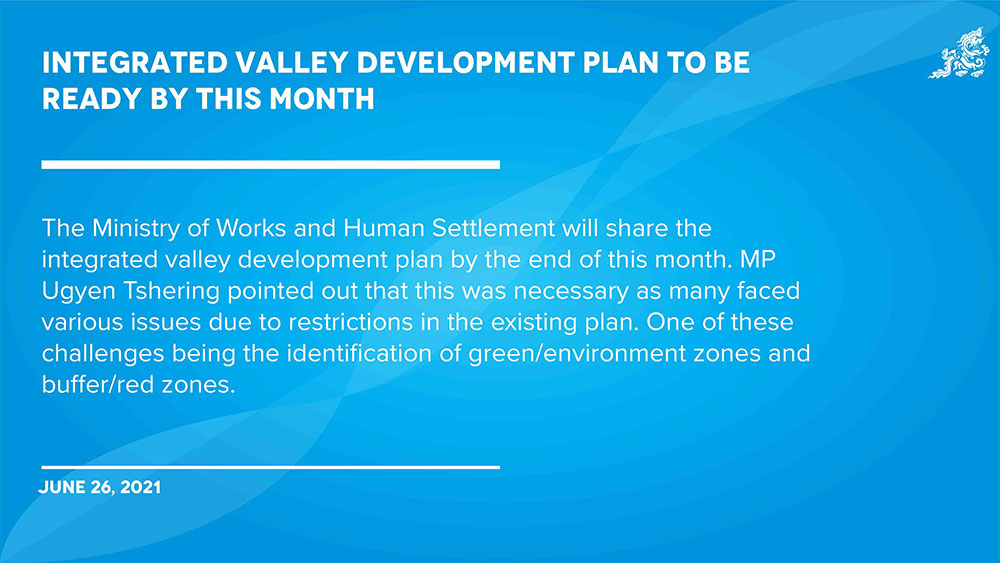Chhimi Dema
The Ministry of Works and Human Settlement (MoWHS) will share the integrated valley development plan by end of this month, according to Minister Dorji Tshering.
This was in response to MP Ugyen Tshering’s question on when the ministry would review the valley development plan. The question was asked during the question hour session in the National Council last week.
The valley development plan, introduced in 2019, aims to promote integrated planning by keeping traditional architectures intact and the cultural landscape preserved.
MP Ugyen Tshering pointed out that people faced challenges and issues due to the valley development plan’s restrictions.
Some of the challenges and issues people face, he said, were the identification of the green or environment zone and buffer or red zone.
Green zones are a designated area in which there should not be any construction or excavation, whereas red zones are areas that have higher risk and vulnerability to increasing exposure to disasters.
“There is no clear directive on land substitutions for those households whose land falls under green zone or environmentally sensitive zones,” MP Ugyen Tshering said.
He said in the buffer zone, owing to the dangers of natural calamities like glacier outburst and flood, people were not allowed to initiate any development activity.
Lyonpo Dorji Tshering said that the restrictions for development activities in these areas were based on discussions in parliament and abiding by the legalisations in the country.
He said that the ministry had to follow legalisations such as the land, water, forest and nature conservation, and road Act for their decisions.
The Road Act of Bhutan 2004 states: “Construction of temporary, semi-permanent and permanent structures shall not be permitted within the road right of way and road control area except for road construction and maintenance.”
And the Land Act of Bhutan 2007 only allows a landowner without a house inheriting only chhuzhing (wetland) in his Thram to apply for residential land.
Lyonpo said: “The ministry is in a tight spot between legalisations passed from the two Houses restricting the ministry and people’s expectation to start development activities in the restricted areas.”
However, to form consensus on the issues, the ministry was working on the integrated valley development plan in the past 10 months, he said.
MP Ugyen Tshering said that it was the ministry’s responsibility to consult with the relevant agencies if the existing laws needed changes.
“If any area was identified as green zones, then a clear indication of the usage of the land should be stated, and people should be given a land replacement or compensation,” he said.
Lyonpo said that it was not within the ministry’s purview to give land replacement or compensation. He added that the National Land Commission was pursuing the matter.
Edited by Jigme Wangchuk


